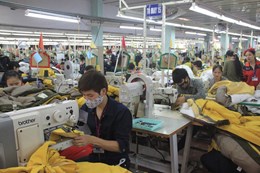-

According to Decision No.1483/QD- issued by Bac Giang Provincial People's Committee on Economical and Efficient Use of Energy Program, Bac Giang strives to save between 5% and 8% of total energy consumption in 2016 - 2020.
-

This is the goal that Ba Ria - Vung Tau set to enforce the Law on Economical and Efficient use of Energy. The rational use of electricity and power savings become ever more urgent when this important energy source has signs of outage and deficiency.
-

Optimization of the robot's movements reduces acceleration and deceleration, as well as the time the robot is at a standstill since being at a standstill also consumes energy.
-

With more than half of the world’s population and emerging economies, Asian countries have the potential to play a significant role in reducing energy consumption through adoption of energy efficiency techniques.
-

The Business Energy Challenge (BEC) awards celebrate private sector firms who have made the biggest difference to their energy consumption by switching to cleaner and more energy efficient technologies.
-

At the workshop, large energy consumers and experts in the field of power saving shared experience and new technology solutions to reduce the energy consumption rate, energy audits and improvement of the production system, and power consuming devices.
-

Representatives of the Ministry of Construction reveal that buildings consume more than 30% of total energy consumption in the fast growing economy. Thus improving the energy efficiency for the new construction is an urgent requirement.
-

India's state-owned fertiliser manufacturer Rashtriya Chemicals and Fertilizers (RCF) is reportedly planning to reduce energy consumption at two of its urea-ammonia units in Thal, Maharashtra.
-

Nearly 40 % of energy consumption in the EU goes to heating, cooling and lighting buildings. Their energy demands account for large amounts of carbon dioxide emissions.
-

Countries in the European Union have some bold energy targets for the year 2030, including a non-binding goal to source at least 27% of their final energy consumption from renewable sources.
-

iltration processes using membranes could potentially reduce energy consumption compared to other separation methods.
-

A line improvement programme undertaken by Sidel at Japan’s Kirin Distillery has resulted in a substantial saving in the use of electrical energy.
-

Azerbaijan completely ensures its gross energy consumption through domestic production, which is mainly reliant on the exploitation of the country’s hydrocarbon reserves. But this does not remove the possibility of implementing an energy saving system from the agenda.
-

The findings from a survey in 300 hotels, buildings in the southern region, conducted by HCM city Center of Energy Conservation show that the top energy consuming factor is the air-conditioning system (65%), followed by hot water system, accounting for over 15% of the total energy consumption.
-

Volvo Group achieved its goal of reduced energy consumption in the U.S. Department of Energy (DOE) Better Buildings, Better Plants Challenge five years earlier than anticipated, the company announced.
-

Based on the survey findings at 300 hotels, buildings in the south conducted by the Energy Conservation Center of HCM City, the frontline consumers of energy is the air-conditioning system (65% ), followed by water heating system ranked with over 15% of the total energy consumption.
-

On the basis of the data provided by Colusa Miliket, after the intro¬duction of the Energy Managemnt System measures, it was possible to see 12% savings in energy consumption.
-

Energy consumption of 107.09 kWh and 29.6 kg of foil oil per production of 1,000 litres of beer in 2012 have also improved to 105.7 kWh and 28.96 kg of fuel oil respectively per 1,000 litres of beer in 2013. This has effectively increased the bottom line of the organisation.
-

On 15/07/2014, Bac Kan Provincial People's Committee issued Decision No. 1165/QD-UBND to approve the program of Economical and Efficient Use of Energy for the period 2014 - 2015. The goal in 2015 is to save 5-8% of total energy consumption. For agencies and units using state budget, and the public service units, they are expected to make a saving of 5% of the annual electricity consumption, at least 2-3% of energy in industrial production, 3% of electricity in domestic use.
-

With outdated technology of huge energy consumption, Thu Duc Steel JSC is keenly aware of its problems: the competition increases fiercely in the steel market, products with competitive price and quality stability will exist, thus the urgent demands for reducing the input costs are the top concerns of the Management. During the past time, Thu Duc Steel JSC has successfully implemented three typical improvements with investment into equipment upgrade to reduce energy consumption.




















 Consultation on the methodology for developing and updating energy consumption standards for four major industrial sectors
Consultation on the methodology for developing and updating energy consumption standards for four major industrial sectors
 Opening of the 2025 Energy-Efficient Equipment and Green Transition Exhibition Fair
Opening of the 2025 Energy-Efficient Equipment and Green Transition Exhibition Fair
 Energy-saving solutions and green transition promotion
Energy-saving solutions and green transition promotion
 The 9th VEPG Steering Committee Meeting: Strengthening Coordination for Viet Nam’s Just Energy Transition
The 9th VEPG Steering Committee Meeting: Strengthening Coordination for Viet Nam’s Just Energy Transition